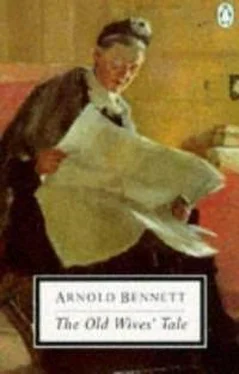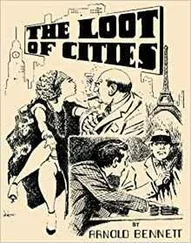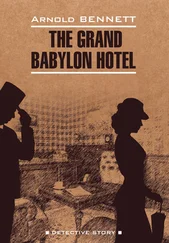The Old Wives' Tale
Arnold Bennett
To W. W. K.
PREFACE TO THIS EDITION
In the autumn of 1903 I used to dine frequently in a restaurant in the Rue de Clichy, Paris. Here were, among others, two waitresses that attracted my attention. One was a beautiful, pale young girl, to whom I never spoke, for she was employed far away from the table which I affected. The other, a stout, middle-aged managing Breton woman, had sole command over my table and me, and gradually she began to assume such a maternal tone towards me that I saw I should be compelled to leave that restaurant. If I was absent for a couple of nights running she would reproach me sharply: "What! you are unfaithful to me?" Once, when I complained about some French beans, she informed me roundly that French beans were a subject which I did not understand. I then decided to be eternally unfaithful to her, and I abandoned the restaurant. A few nights before the final parting an old woman came into the restaurant to dine. She was fat, shapeless, ugly, and grotesque. She had a ridiculous voice, and ridiculous gestures. It was easy to see that she lived alone, and that in the long lapse of years she had developed the kind of peculiarity which induces guffaws among the thoughtless. She was burdened with a lot of small parcels, which she kept dropping. She chose one seat; and then, not liking it, chose another; and then another. In a few moments she had the whole restaurant laughing at her. That my middle-aged Breton should laugh was indifferent to me, but I was pained to see a coarse grimace of giggling on the pale face of the beautiful young waitress to whom I had never spoken.
I reflected, concerning the grotesque diner: "This woman was once young, slim, perhaps beautiful; certainly free from these ridiculous mannerisms. Very probably she is unconscious of her singularities. Her case is a tragedy. One ought to be able to make a heartrending novel out of the history of a woman such as she." Every stout, ageing woman is not grotesque--far from it!--but there is an extreme pathos in the mere fact that every stout ageing woman was once a young girl with the unique charm of youth in her form and movements and in her mind. And the fact that the change from the young girl to the stout ageing woman is made up of an infinite number of infinitesimal changes, each unperceived by her, only intensifies the pathos.
It was at this instant that I was visited by the idea of writing the book which ultimately became "The Old Wives' Tale." Of course I felt that the woman who caused the ignoble mirth in the restaurant would not serve me as a type of heroine. For she was much too old and obviously unsympathetic. It is an absolute rule that the principal character of a novel must not be unsympathetic, and the whole modern tendency of realistic fiction is against oddness in a prominent figure. I knew that I must choose the sort of woman who would pass unnoticed in a crowd.
I put the idea aside for a long time, but it was never very distant from me. For several reasons it made a special appeal to me. I had always been a convinced admirer of Mrs. W. K. Clifford's most precious novel, "Aunt Anne," but I wanted to see in the story of an old woman many things that Mrs. W. K. Clifford had omitted from "Aunt Anne." Moreover, I had always revolted against the absurd youthfulness, the unfading youthfulness of the average heroine. And as a protest against this fashion, I was already, in 1903, planning a novel ("Leonora") of which the heroine was aged forty, and had daughters old enough to be in love. The reviewers, by the way, were staggered by my hardihood in offering a woman of forty as a subject of serious interest to the public. But I meant to go much farther than forty! Finally as a supreme reason, I had the example and the challenge of Guy de Maupassant's "Une Vie." In the nineties we used to regard "Une Vie" with mute awe, as being the summit of achievement in fiction. And I remember being very cross with Mr. Bernard Shaw because, having read "Une Vie" at the suggestion (I think) of Mr. William Archer, he failed to see in it anything very remarkable. Here I must confess that, in 1908, I read "Une Vie" again, and in spite of a natural anxiety to differ from Mr. Bernard Shaw, I was gravely disappointed with it. It is a fine novel, but decidedly inferior to "Pierre et Jean" or even "Fort Comme la Mort." To return to the year 1903. "Une Vie" relates the entire life history of a woman. I settled in the privacy of my own head that my book about the development of a young girl into a stout old lady must be the English "Une Vie." I have been accused of every fault except a lack of self-confidence, and in a few weeks I settled a further point, namely, that my book must "go one better" than "Une Vie," and that to this end it must be the life-history of two women instead of only one. Hence, "The Old Wives' Tale" has two heroines. Constance was the original; Sophia was created out of bravado, just to indicate that I declined to consider Guy de Maupassant as the last forerunner of the deluge. I was intimidated by the audacity of my project, but I had sworn to carry it out. For several years I looked it squarely in the face at intervals, and then walked away to write novels of smaller scope, of which I produced five or six. But I could not dally forever, and in the autumn of 1907 I actually began to write it, in a village near Fontainebleau, where I rented half a house from a retired railway servant. I calculated that it would be 200,000 words long (which it exactly proved to be), and I had a vague notion that no novel of such dimensions (except Richardson's) had ever been written before. So I counted the words in several famous Victorian novels, and discovered to my relief that the famous Victorian novels average 400,000 words apiece. I wrote the first part of the novel in six weeks. It was fairly easy to me, because, in the seventies, in the first decade of my life, I had lived in the actual draper's shop of the Baines's, and knew it as only a child could know it. Then I went to London on a visit. I tried to continue the book in a London hotel, but London was too distracting, and I put the thing away, and during January and February of 1908, I wrote "Buried Alive," which was published immediately, and was received with majestic indifference by the English public, an indifference which has persisted to this day.
I then returned to the Fontainebleau region and gave "The Old Wives' Tale" no rest till I finished it at the end of July, 1908. It was published in the autumn of the same year, and for six weeks afterward the English public steadily confirmed an opinion expressed by a certain person in whose judgment I had confidence, to the effect that the work was honest but dull, and that when it was not dull it had a regrettable tendency to facetiousness. My publishers, though brave fellows, were somewhat disheartened; however, the reception of the book gradually became less and less frigid.
With regard to the French portion of the story, it was not until I had written the first part that I saw from a study of my chronological basis that the Siege of Paris might be brought into the tale. The idea was seductive; but I hated, and still hate, the awful business of research; and I only knew the Paris of the Twentieth Century. Now I was aware that my railway servant and his wife had been living in Paris at the time of the war. I said to the old man, "By the way, you went through the Siege of Paris, didn't you?" He turned to his old wife and said, uncertainly, "The Siege of Paris? Yes, we did, didn't we?" The Siege of Paris had been only one incident among many in their lives. Of course, they remembered it well, though not vividly, and I gained much information from them. But the most useful thing which I gained from them was the perception, startling at first, that ordinary people went on living very ordinary lives in Paris during the siege, and that to the vast mass of the population the siege was not the dramatic, spectacular, thrilling, ecstatic affair that is described in history. Encouraged by this perception, I decided to include the siege in my scheme. I read Sarcey's diary of the siege aloud to my wife, and I looked at the pictures in Jules Claretie's popular work on the siege and the commune, and I glanced at the printed collection of official documents, and there my research ended.
Читать дальше











